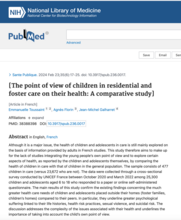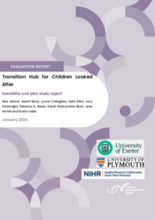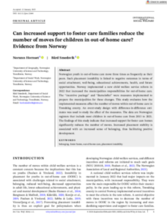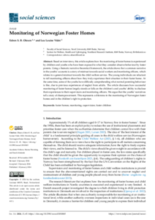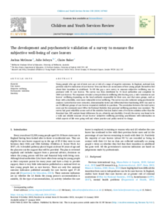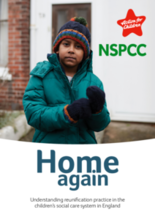

Displaying 111 - 120 of 1643
Although it is a major issue, the health of children and adolescents in care is still mainly explored on the basis of information provided by adults in French studies. This study therefore aims to make up for the lack of studies integrating the young people’s own point of view and to explore certain aspects of health, as reported by the children and adolescents themselves, by comparing the health of children in care with that of children in the general population.
The first-ever National Kinship Care Strategy has been published. This session aims to explore the implications of the strategy on social work with kinship families and the impact it has on local authority planning, practice and workforce. The panel event will take place online via zoom on Tuesday 30th January 11.30am – 1.30pm.
This is a feasibility and pilot evaluation of the Transition Hub -- a multi-disciplinary team which aims to support young people aged 11 to 17 who are making the transition into care or experiencing a placement transition in England. The feasibility phase explored the feasibility of delivery and aimed to provide lessons for further research. The pilot phase examined whether the Transition Hub might evidence promise on desired outcomes and sought to offer further learning about delivery and acceptability.
Amy and Ano are identical twins, but just after they were born they were taken from their mother and sold to separate families. Years later, they discovered each other by chance thanks to a TV talent show and a TikTok video. As they delved into their past, they realised they were among thousands of babies in Georgia stolen from hospitals and sold, some as recently as 2005. Now they want answers.
Norwegian youth in out-of-home care move three times as frequently as their peers. Such placement instability is linked to negative outcomes in terms of social attachment, well-being, educational achievements, health, and future opportunities. Norway implemented a new child welfare service reform in 2022 that increased the municipalities responsibilities for out-of-home care. This study evaluates how the implemented measures affect the number of moves within out-of-home care in Trøndelag county. Norway.
This article explores how the monitoring of foster homes in Norway is experienced by children and youths who have been exposed to what they consider abusive behaviour by foster parents. Using a thematic narrative theoretical framework, the article shows that a common narrative in the youths’ accounts is a story of mistrust towards social workers and monitoring officers, which relates to a general mistrust towards the child welfare service.
Young people who age out of state care are at risk of a range of negative outcomes. In England, national data provides only five indicators of care leavers’ lives and there are no measures of how young people themselves feel about their transition to adulthood. To fill this gap a new survey to measure subjective wellbeing was coproduced with 31 care leavers. The survey was then distributed by 21 local authorities and completed by 1804 care leavers.
Understanding reunification practice in the children’s social care system in England
One council worker said they had to ‘beg, borrow and steal’ to get the right support
This is a report about the Parental Rights in Prison Project (PRiP) based in Wales and England aimed at supporting incarcerated parents who wished to sustain their relationship with their children who are in the care of the local authority, care of family and significant others or adopted and to provide them with legal advice and support around their rights as parents.

